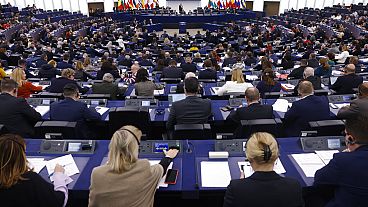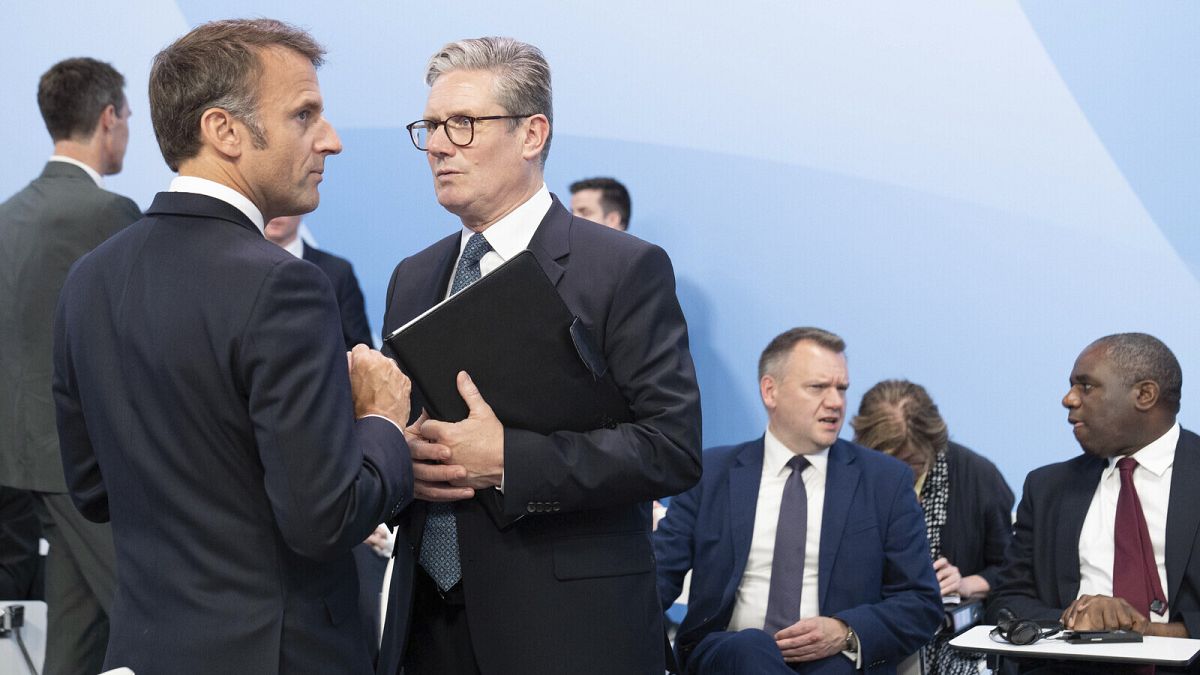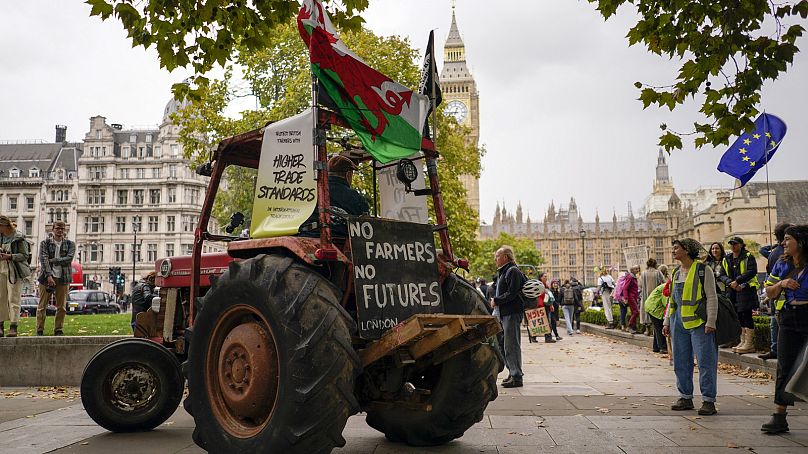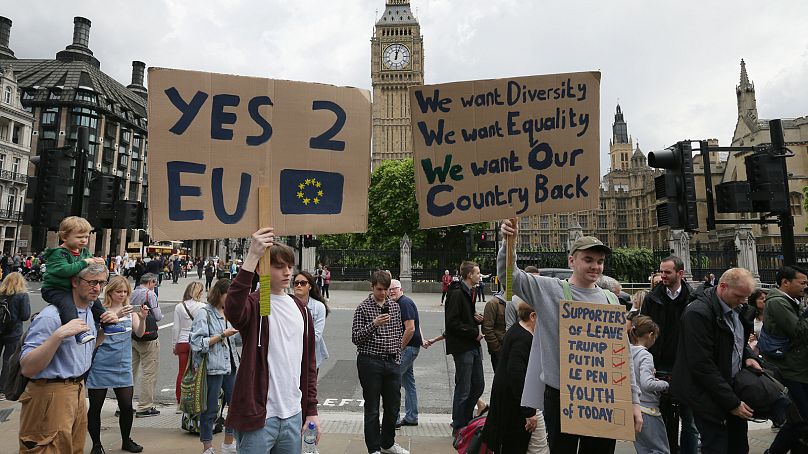As the UK Labour government’s honeymoon period fades, it must now get down to the nitty-gritty of its EU reset.
In Brussels and London, hopes are high that Keir Starmer's freshly-installed UK government is about to get down to business to recalibrate the UK's relationship with the European Union.
Starmer has wasted no time in laying the groundwork for his promised "reset": the NATO and European Political Community (EPC) summits in July were a chance for the new British prime minister to speed-date EU counterparts, and his ministers have since been criss-crossing the continent to reboot bilateral relations.
His message - that the UK wants to repair its strained EU ties - was perfectly delivered in a July selfie with his German and Spanish counterparts, Olaf Scholz and Pedro Sánchez, during England's clash against Spain in the Euro 2024 final in Berlin.
But while the mood music has changed, the substance of Starmer’s plans to tweak the frameworks that define cooperation between both sides remains uncertain.
During his election campaign, he vowed to renegotiate what he described as Boris Johnson’s "botched" Brexit deal, but carefully ruled out re-joining either the EU's single market or customs union, or reinstating the free movement of people across the EU-UK border.
Measures to streamline the trading relationship and an ambitious security pact are now all on the table, and there's political will on either side of the Channel to get down to business.
"EU representatives were in very quick contact with the new British prime minister," one EU diplomat said, "and it's not just a question of security and defence, we have many issues on the table to talk about."
Removing trade frictions
One of the first priorities of Starmer's government will be to ease some of the post-Brexit trading frictions that have burdened British businesses.
He has vowed to negotiate a new Sanitary and Phytosanitary (SPS) agreement, also known as a veterinary deal, that would slash checks and barriers on agricultural trade.
Since the UK formally left the bloc in December 2020, the EU has applied full border controls on British agri-food imports, requiring comprehensive checks and a veterinarian signature to ensure compliance with EU standards. The UK snapped back with similar checks on EU imports in January this year.
The previous UK government estimated that the checks on animal and plant imports were costing businesses 390 million euros a year, with industry placing it closer to 3.5 billion euros.
A new SPS deal could therefore bring economic benefits to the agri-food sector on both sides, assuaging the still-brewing discontent among European farmers, but also reducing the cost of consumers' shopping baskets.
The EU executive is likely to demand that the UK aligns fully, now and in the future, with relevant single market agri-food regulations, known as 'dynamic alignment'. The UK's willingness to do so, which would mean accepting a role for the European Court of Justice (ECJ), could be a breakthrough that would trigger closer cooperation in a range of other areas.
"Labour has not ruled out a role for the European Court of Justice, and it's spoken very positively - not only in the veterinary field, but also for example in chemicals - about the value to domestic industry of aligning with EU rules," Luigi Scazzieri, a senior research fellow at the Centre for European Reform, told Euronews.
"This is something that the UK is already doing spontaneously, so why not formalise that so that your businesses then have an easier time when exporting to the EU market?" he added.
Other minor demands Labour previewed in its manifesto include a deal to relieve the administrative demands on performing artists touring in the EU and the UK, and the mutual recognition of professional qualifications.
While marginal in their economic significance, they could provide early wins for Labour as it aims to iron out the creases in the broad-ranging economic relationship between both sides.
Quid-pro-quo demands
But the EU executive in Brussels is going to be reluctant to let the UK cherry-pick its way to a better relationship until ongoing issues in the new relationship are solved.
The UK is yet to fully comply with some border checks on EU-imported goods required under the 2020 Trade and Cooperation Agreement (TCA), or product labelling requirements under the Windsor Framework. Until it does so, a new SPS deal is likely to be off the table.
Brussels will also likely want to smooth out ongoing issues with the rights of EU citizens living in the UK, thousands of whom have faced difficulties claiming settled status that promised their rights would be unchanged post-Brexit. Post-Brexit arrangements for Gibraltar also remain unsolved.
"The previous government preferred to duck and avoid some of these issues because they're difficult, and accepted the price, which was a static relationship," Joel Reland, a research fellow at UK in a changing Europe, told Euronews. "If Labour wants to actually take the relationship further, it needs to deal with those issues."
"As much as it's good to show that you're much friendlier towards the EU, the Commission is going to be reluctant to look at many forms of new cooperation until existing obligations are dealt with," Reland explained.
He adds that another request high on Brussels' list is a youth mobility deal that would make it easier for young Brits and Europeans to move across the UK-EU border to study, work and live.
The European Commission proposed the opening of negotiations on a youth mobility deal in April this year, but Labour repeatedly dismissed the prospect in its election campaign for fear it would be misinterpreted as a return to free movement, something that is considered still unpalatable for swathes of the British electorate.
Reland believes Labour now faces a dilemma as it decides whether to hold its opposition to the scheme as it did during campaigning, or attempt to strike a watered-down deal that is both acceptable to the Commission and to the EU-sceptic parts of its domestic audience.
A 'privileged' security partner
EU diplomats say that, in a more dangerous and geopolitically volatile world, and with the prospect of Donald Trump's return to the White House still looming, a government in London that is more open to a close-knit relationship on security and defence is welcome.
"Obviously the UK has to be a privileged partnership on foreign and defence policy for us," an EU diplomat said.
While the previous Conservative government led by Rishi Sunak was also seen as a constructive security partner, EU officials see an opportunity to formalise the partnership under Starmer's leadership with an EU-UK security pact.
"While the previous (UK) government wasn't unconstructive, this new government doesn't come with the baggage of the Conservative Party, and in general has a much more pro-European narrative," Luigi Scazzieri of CER said.
"This (security) pact is not fully fleshed out, but from what the UK's foreign minister David Lammy has said, the idea would be to go fairly broad and to have a set of arrangements that allow the UK and the EU to cooperate more closely, from foreign policy proper, to also areas like migration, energy security, health security and critical raw materials," he added.
Enhanced participation in EU military and civilian Common Security and Defence Policy (CSDP) missions, and closer cooperation on security issues such as illegal migration, border control and terrorism are likely to be quick wins.
But Scazzieri believes Brussels will likely limit security ambitions that have "an economic angle" for fears it could "be a way of circumventing the 2020 Trade and Cooperation agreement."
This could mean that the UK will not seek to associate itself with any new schemes spearheaded by the new Commissioner for defence, expected to be named by European Commission president Ursula von der Leyen in the coming weeks and tasked with streamlining the bloc's domestic defence industries to be more efficient and interoperable.
"That (would require) the UK making financial contributions to the EU's programmes, which I suspect there is a big block on in London," Scazzieri said.














